Today, marketing teams face a critical challenge: delivering personalized customer experiences while managing increasingly complex digital marketing plans. While many businesses invest in artificial intelligence technologies, most struggle to implement them effectively. The gap isn’t in technology—it’s in strategic implementation.
Artificial intelligence (AI) is a business multiplier, enabling companies to process millions of data points instantly and make real-time decisions that drive measurable growth.
An effective AI marketing strategy transforms how businesses understand and engage with customers. By combining AI in marketing with proven practices, companies can automate routine tasks, deliver personalized experiences at scale, and make data-driven decisions that drive growth.
Ready to transform your marketing with AI? Let’s dive in.
Table of contents
- What is an AI marketing strategy?
- 6 benefits of using AI in marketing strategy
- How Birdeye’s GenAI tools help in executing AI marketing strategies
- How to create an AI digital marketing strategy
- Best AI marketing tools for different business needs
- Strategic best practices to follow when creating your AI marketing strategy
- FAQ about AI marketing strategy
- Scale your business with Birdeye’s AI marketing tools
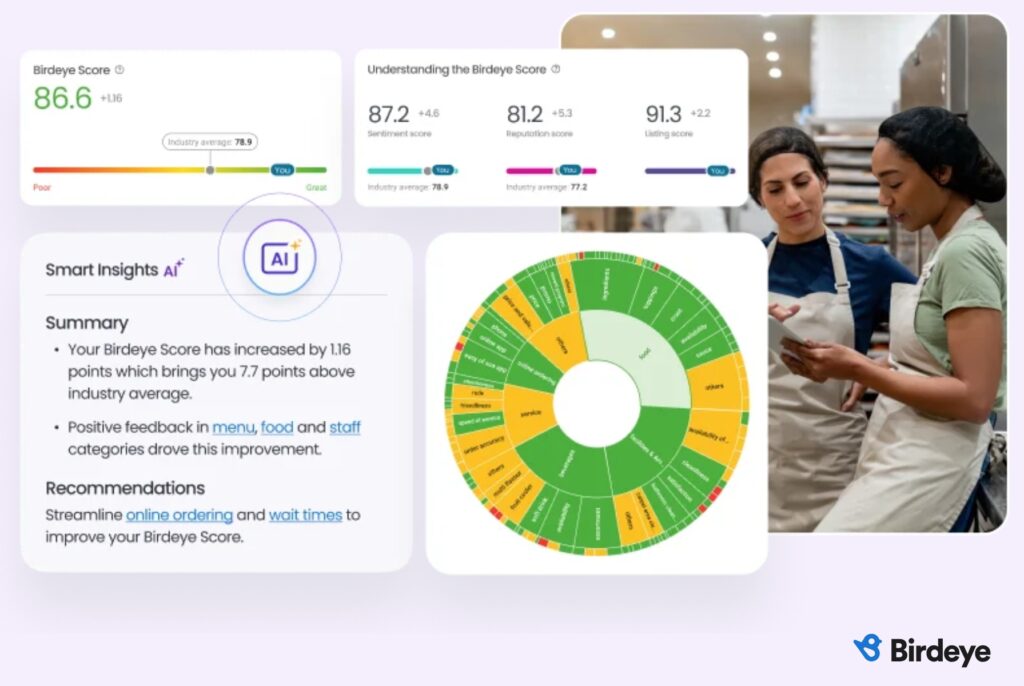
What is an AI marketing strategy?
An AI marketing strategy is a framework for incorporating AI into marketing activities to automate tasks, analyze customer data, and deliver personalized experiences at scale. It helps businesses improve efficiency, make data-driven decisions, and enhance customer engagement through AI-powered tools and technologies.
Essential components of modern AI marketing include:
- Advanced systems to analyze and reveal user insights
- Generative AI (GenAI) for creating personalized marketing assets
- Predictive analytics for understanding customer behavior
- Automate marketing campaign and optimization
- Enhanced customer engagement through natural language processing
- Streamlined workflows for improved performance
But here’s the reality: while 67% of marketing teams use AI and digital tools, only 24% successfully integrate them into their marketing strategy. The challenge lies in the strategic implementation of AI in marketing.
To drive results, effective AI marketing strategies must be built on three critical factors:
- Strategic alignment between AI capabilities and marketing goals
- Seamless integration with existing digital advertising and marketing systems
- Focus on measurable improvements in lead generation
The success story of Mecca Property Management since integrating AI:
Challenge: Mecca Property Management, managing 2 million square feet of commercial space and 1,300 residential units, struggled with manual survey processes. They needed an automated solution to gather resident feedback efficiently and improve their services.
Solution: Implemented Birdeye Surveys AI, integrated with their PMS (Appfolio), to automate feedback collection at key touchpoints:
- Move-in surveys
- Work order completion surveys
- Renewal feedback
- Custom resident satisfaction surveys
Results:
- 54% increase in NPS promoters within 6 months
- Maintained a 4.5-star average rating across all properties
- Automated feedback collection saved significant administrative time
"Birdeye’s automation has been a game-changer. We no longer have to send surveys manually, Surveys AI does it for us, which saves us a lot of time and ensures consistency." - Travis Baker, President of Mecca Property Management
Mecca Property Management proved that success isn’t measured by the volume of marketing campaigns but by implementing strategic AI-powered marketing tools that deliver exceptional results.
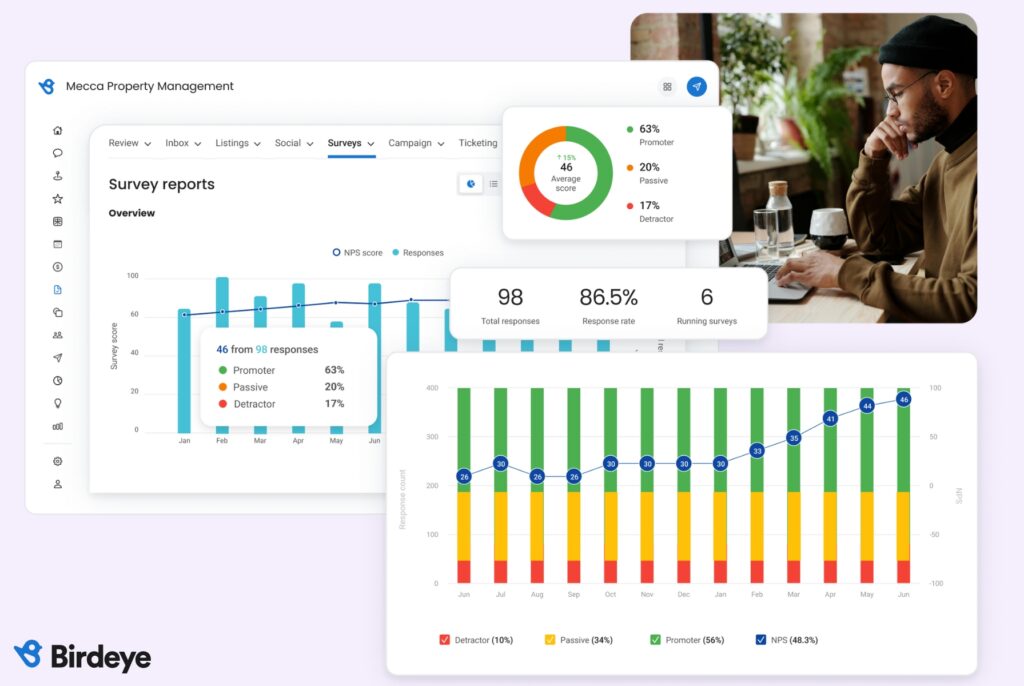
6 benefits of using AI in marketing strategy
AI in marketing isn’t just about automation – it’s about transforming how businesses understand and connect with their target audience. Here are the key benefits that make AI marketing strategy essential for modern businesses:
Enhanced customer insights
AI tools dig deeper into customer data than traditional analytics ever could. AI-driven customer insights analyze patterns across social media posts, feedback, and user behavior to reveal insights that help digital marketers make better decisions. This deep understanding helps create profitable marketing campaigns that resonate with your target audience.
Automated marketing workflows
AI marketing tools automate email marketing and routine tasks like social media scheduling and data entry, freeing your marketing team to focus on strategic thinking and creative work. Instead of managing tedious marketing tasks, your team can focus on developing innovative marketing strategies.
Personalized marketing at scale
Creating personalized content for different customer segments used to be a resource-intensive process. AI marketing can improve customer experience by automatically generating personalized messages and content based on customer behavior and preferences. This means every customer gets relevant content without overwhelming your team.
Predictive analytics and market intelligence
AI-powered competitive intelligence helps you stay ahead of market trends. You can identify emerging opportunities through machine learning and data analysis and adjust your digital marketing strategy accordingly. This proactive approach helps your marketing efforts deliver better results.
Improved campaign performance with machine learning
Digital marketing tools optimize performance by continuously analyzing customer interactions and campaign metrics. They help identify what works and what doesn’t, allowing marketers to refine their approach for better results. This leads to a more effective marketing funnel.
Enhanced customer experience
Perhaps the most significant benefit is the improved customer experience. AI tools help manage customer inquiries, provide personalized recommendations, and ensure consistent engagement across all channels. This leads to stronger reputation management powered by AI, which helps increase customer satisfaction.
AI Marketing Strategy: Build, Launch, and Succeed
Want to see the impact of Birdeye on your business? Watch the Free Demo Now.
How Birdeye’s GenAI tools help in executing AI marketing strategies
Modern marketing success requires a comprehensive approach. Birdeye’s GenAII tools combine six powerful AI marketing tools to transform your marketing operations. Each tool addresses marketing challenges while enhancing the overall customer experience.
Let’s explore how each component addresses key challenges in AI-powered marketing:
Reviews AI
Reviews remain the cornerstone of true customer experience and business growth. Birdeye’s Reviews AI transforms how businesses handle customer feedback, moving beyond basic review management to intelligent response generation and sentiment analysis. Here’s how it benefits you:
- Analyzes user feedback across platforms
- Generates personalized responses to customer reviews
- Identifies sentiment patterns to improve customer experience
- Helps teams track and improve consumer satisfaction
Customer success story: Fireman Hospitality Group
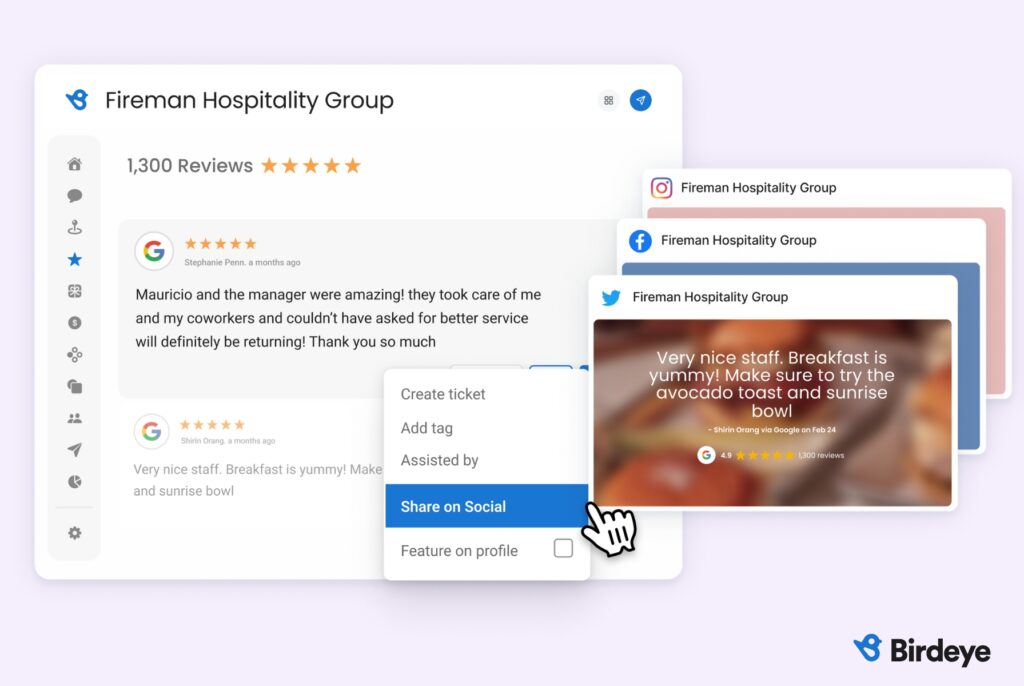
Challenge: Fireman Hospitality Group, with 13 restaurants in New York City and Maryland, struggled to manage their online presence and guest feedback across multiple locations. They needed an automated solution to collect, manage, and leverage guest reviews while maintaining their reputation for exceptional hospitality.
Solution: Implemented Birdeye’s integrated solution:
- Connected Birdeye Reviews with Toast POS system
- Automated review collection via text/email
- Streamlined review response system
- Social media integration for review sharing
- Consolidated reporting dashboard
Results:
- Generated 8,900+ new reviews across platforms
- Collected 4,000+ new Google reviews
- Maintained 4.3-star average rating
- Achieved 97% review response rate
- Gained 63,000 new Instagram followers
"Thanks to Birdeye, we can keep our restaurant top-of-mind for our guests, making us their go-to choice for future visits.” Stephanie Holmes, Director of Guest Services, Fireman Hospitality Group
Listing AI
Accurate listing management is crucial for businesses looking to maintain a strong local presence. Listings AI ensures your business information remains consistent and optimized across all digital platforms as it:
- Maintains accurate business information across platforms
- Improves local search visibility
- Analyzes customer behavior by location
- Enhances digital marketing strategy for multi-location businesses
Insights AI
Understanding consumer data is key to effective marketing campaigns. Insights AI turns complex customer data into actionable marketing strategies through advanced analytics and machine learning to:
- Process data to reveal actionable insights
- Tracks performance across channels
- Provide competitive intelligence
Social AI
Social media marketing demands constant attention and creative content. Social AI is your intelligent social media manager, handling everything from content creation to performance analysis by:
- Streamlining social media scheduling
- Creating engaging social media posts
- Analyzing social media performance
- Adapting content based on user behavior
- Automating repetitive tasks in social media marketing
Customer success story: Pacifica Senior Living
Challenge: Pacifica Senior Living, with 96 senior living communities across the US, struggled to manage social media content across multiple locations while maintaining brand consistency. They needed a centralized solution to manage content creation, approval workflows, and engagement for approximately 300 users.
Solution: Implemented Birdeye Social to streamline their social media management:

- Centralized dashboard for content management
- Mobile app for real-time content capture
- Streamlined approval workflows
- Automated posting schedules
- Unified engagement monitoring across platforms
Results:
- Published 11,200 posts across locations in 9 months
- Averaged 4 posts per week per location
- Achieved a 25% increase in engagement across digital platforms in 6 months
- Streamlined content approval process for 300+ users
“Implementing Birdeye Social AI has been a game-changer for us. Since its rollout across our communities, we've seen a surge in engaging content, particularly short-form videos that excel on our corporate platforms." – Sarah Schlosberg, Social Media Coordinator, Pacifica Senior Living
Competitors AI
Staying ahead requires understanding your market position. Competitors AI monitors your competitive landscape, helping you identify opportunities and optimize your marketing efforts by:
- Monitoring competitor marketing efforts
- Identifying market opportunities
- Analyzing competitive marketing strategies
- Optimizing marketing campaigns
Messaging AI
Effective customer communication drives business growth. Messaging AI ensures prompt, personalized responses to customer inquiries while maintaining a consistent brand voice by:
- Providing personalized marketing messages
- Improving customer engagement
- Streamlining marketing workflows
How to create an AI digital marketing strategy
Transforming your marketing with AI doesn’t happen overnight. Like any strategic shift, it requires careful planning and systematic execution. While many businesses rush to adopt AI tools, successful implementation demands a structured approach that aligns technology with business goals.
The following eight steps provide a proven framework for building and implementing an AI marketing strategy that delivers measurable results. Each step builds on the previous one, creating a solid foundation for long-term success.
Let’s explore each step in detail.
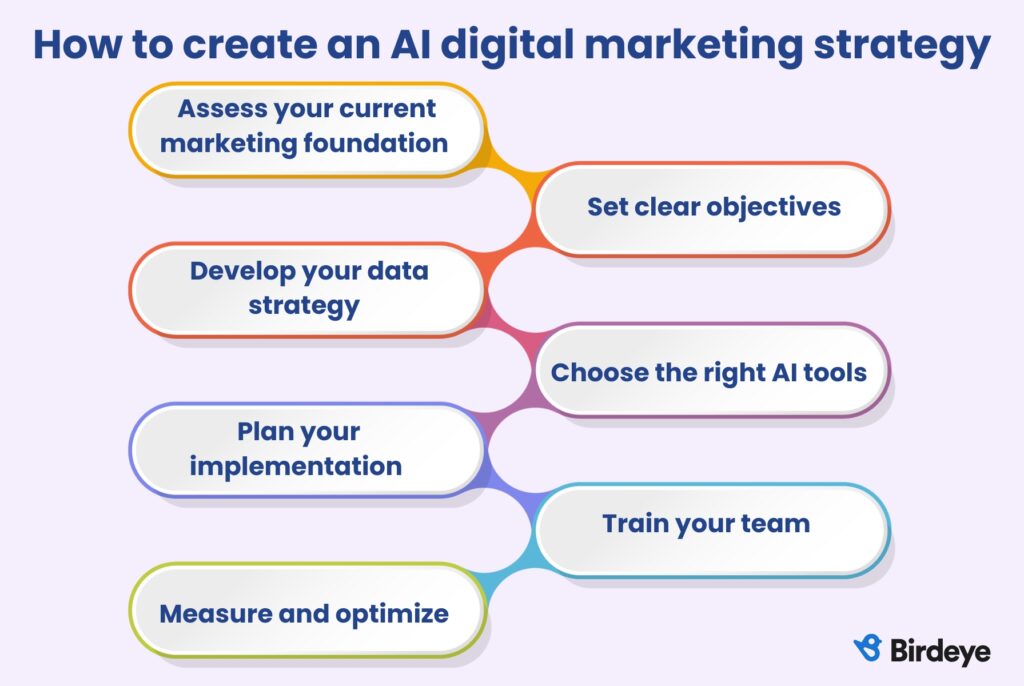
- 1. Assess your current marketing foundation
Before diving into AI tools, examine your existing marketing efforts. Understanding your current processes, strengths, and pain points helps identify where AI can most impact:
- Which tasks consume most of your team’s time
- Current customer engagement metrics
- Areas where personalized content could drive better results
- Existing data collection and analysis processes
- 2. Set clear objectives
Success with AI marketing requires specific, measurable goals. Don’t implement AI just because it’s trendy – identify how it will improve your marketing customer experience strategy.
- Increase customer engagement through automated interactions
- Improve content creation efficiency
- Enhance analytics capabilities
- Streamline social media management
- Automate repetitive tasks
- 3. Develop your data strategy
AI’s effectiveness depends entirely on the quality of your data. Create a robust framework for collecting, organizing, and analyzing data across all touchpoints.
- Setting up proper data collection methods
- Ensuring data privacy compliance
- Creating a unified platform
- 4. Choose the right AI tools
AI tools should solve specific problems in your marketing workflow. Focus on solutions that integrate well with your existing technology stack and provide clear value to your marketing efforts.
- Content creation tools for marketing materials
- Social media management platforms
- Customer engagement solutions
- Marketing automation software
- 5. Plan your implementation
A successful AI marketing strategy requires careful planning. Start small and scale gradually, ensuring each step delivers measurable results before expanding further.
- Start with one key marketing workflow
- Test AI-generated content quality
- Monitor customer feedback
- Adjust based on results
- 6. Train your team
Your marketing team’s comfort with AI tools directly impacts success. Create a comprehensive training program that builds confidence and competence with new technologies.
- Use AI for local SEO to increase your search findability
- Provide tool-specific training
- Define roles and responsibilities
- Create standard operating procedures
- 7. Measure and optimize
Regular performance assessment ensures your AI marketing strategy delivers results. Set clear metrics and review them consistently to guide optimization efforts.
- Analyze customer experience improvements
- Track ROI on AI investments
- Gather team feedback
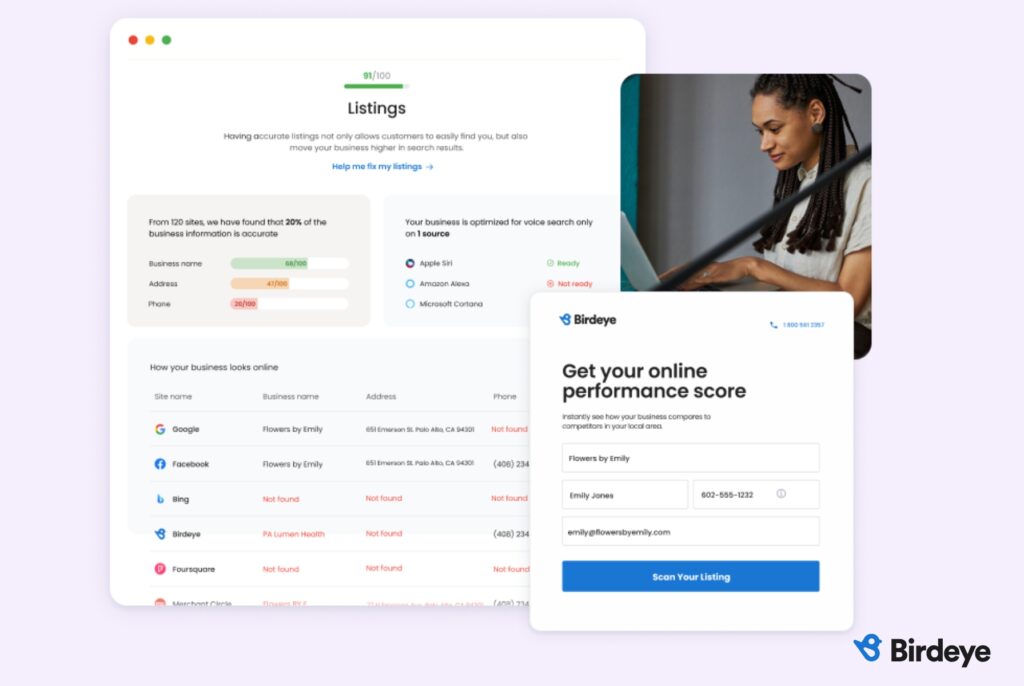
Best AI marketing tools for different business needs
Beyond Birdeye’s suite, integrating specialized AI tools can enhance your digital marketing strategy. Here’s a curated selection of AI-powered marketing tools for different marketing tasks:
AI tools for content creation
The content creation landscape has evolved with AI tools that help marketers efficiently produce high-quality, personalized content.
1. ChatGPT: Powers everything from marketing campaigns to social media posts with AI. Marketers use it to:
- Generate creative content ideas
- Generate marketing content
- Create personalized content variations
- Develop social media content
2. Jasper: Specializes in long-form marketing content:
- Produces blog posts and articles
- Creates marketing materials
- Generates product descriptions
- Writes compelling ad copy
3. Copy.ai: Focuses on conversion-oriented content:
- Crafts marketing campaigns
- Creates landing page copy
- Generates email sequences
- Develops social media captions
AI tools for predictive analytics
These tools help teams analyze data and predict customer behavior.
1. Google Analytics 4: Uses AI to:
- Track user behavior
- Analyze web traffic patterns
- Measure campaign performance
- Provide user insights
2. Tableau: Offers advanced data analysis:
- Creates predictive models
- Visualizes marketing data
- Tracks customer journey
- Monitors market trends
3. Adobe Analytics: Specializes in:
- Customer behavior analysis
- Marketing campaign tracking
- Data processing
- Performance forecasting

AI tools for customer engagement
These tools enhance customer experience through automated interactions.
1. Intercom: Powers customer communication:
- Handles customer feedback
- Automates repetitive tasks
- Provides personalized responses
2. HubSpot: Offers comprehensive customer engagement:
- Automates marketing workflows
- Manages email marketing campaigns
- Tracks customer interactions
- Provides customer insights
3. Salesforce Marketing Cloud: A sales engagement platform that focuses on:
- Customer journey mapping
- Personalized marketing campaigns
- Customer data management
Strategic best practices to follow when creating your AI marketing strategy
Successful AI marketing implementation requires a balanced approach between automation and human oversight. Here are proven practices that drive results:
- Focus on customer value first
AI tools should enhance customer experience, not just automate tasks. Prioritize implementations that directly impact user satisfaction and engagement through personalized content and improved response times.
- Build a strong data foundation
Before implementing any tools, ensure your customer data is clean, organized, and accessible. Quality data powers effective predictive analytics that drive results.
- Start small, scale smart
Begin with focused AI integrations in areas where you can measure clear ROI, such as automating repetitive tasks or enhancing social media management. Use these early wins to guide broader implementation.
Common mistakes to avoid when implementing AI in marketing

Many businesses rush into AI marketing strategy without proper planning, wasting resources and missed opportunities. Understanding these common pitfalls helps you navigate your AI implementation more effectively.
- 1. The “AI will fix everything” mindset
Many businesses view AI as a magical solution that will instantly transform their marketing efforts. This mindset creates unrealistic expectations and implementation issues.
Common misconceptions:
- “Just add AI to our marketing, and everything will improve”
- “The AI will figure out our messy data”
- “The tools are intuitive, our team will figure it out”
- “We’ll see ROI immediately after implementation”
How to avoid this:
- Set specific, measurable objectives for each AI implementation
- Create a structured data preparation plan before adopting AI tools
- Invest in comprehensive team training programs
- Develop realistic timelines with phased implementation goals
- 2. Disconnected technology adoption
Organizations often rush to adopt AI tools without considering their existing technology ecosystem, leading to fragmented systems and inefficient workflows.
Integration issues:
- Poor integration with the current strategy
- Incompatible AI tools and platforms that create data silos
- Unable to create unified customer views
- Redundant tools and processes causing confusion
Solution approach:
- Audit your current marketing technology stack
- Create an integration roadmap before implementation
- Choose AI tools that complement existing systems
- Regularly review and optimize your tech stack
- 3. Overautomation syndrome
In their excitement to leverage AI, many companies automate everything possible, forgetting that effective marketing requires a human touch.
Common mistakes:
- Over-relying on AI for creative decisions
- Automated responses for every customer touchpoint
- Publishing AI-generated content without review
- Generic marketing messages across channels
Solution approach:
- Define clear boundaries for AI automation
- Maintain human oversight for creative and strategic decisions
- Create quality control processes for AI-generated content
- Develop channel-specific content strategies
- 4. Data quality issues
Many organizations underestimate the importance of clean, organized data in AI marketing success.
Data challenges:
- Using unorganized customer records
- Ignoring data privacy requirements like GDPR
- Inconsistent or incomplete data gathering
- Lack of standardized data handling procedures
Best practices:
- Implement data cleaning and organization protocols
- Establish clear data privacy guidelines
- Create standardized data collection processes
- Regular data audits and maintenance
- 5. Inadequate team preparation
Success with AI tools requires more than just purchasing software—it needs prepared teams.
Common issues:
- Insufficient training on AI tools
- Confusion about who manages what
- Lack of standard operating procedures (SOPs) for using AI tools
- Not addressing team concerns and resistance
Solution strategy:
- Develop comprehensive training programs
- Create clear role definitions and responsibilities
- Establish detailed operating procedures
- Implement effective change management practices
- 6. Missing performance metrics
Without proper measurement, you can’t validate AI marketing success or identify areas for improvement.
Measurement gaps:
- No clear KPIs for AI implementation
- Poor tracking of marketing efforts
- Lack of regular performance reviews
- Ineffective ROI measurement
Our recommended approach:
- Establish clear KPIs (like customer lifetime value)
- Set up comprehensive tracking systems
- Schedule regular performance reviews
- Develop ROI measurement frameworks

FAQ about AI marketing strategy
An AI marketing strategy is a powerful approach that leverages AI technologies to improve targeting and personalization, streamline operations, and maximize business success. Embrace this innovation, and watch your marketing efforts soar.
AI boosts customer engagement by delivering personalized messages, automating tasks, and analyzing data to enhance marketing strategies. Embrace these technologies to connect with your customers like never before.
To succeed in AI marketing, prioritize data privacy, transparency, and bias reduction. This not only fosters customer trust but also builds a responsible brand image.
To measure the success of your AI marketing strategy, track key performance indicators (KPIs) such as conversions, customer lifetime value, and return on investment (ROI) using tools like Salesforce and Google Analytics.
Scale your business with Birdeye’s AI marketing tools
The future of marketing lies in intelligently combining AI capabilities with human expertise. Birdeye’s comprehensive suite of GenAI marketing tools provides the foundation for this transformation:
- Enhanced customer insights through advanced analytics
- Automated yet personalized customer interactions
- Streamlined marketing workflows
- Data-driven decision making
- Scalable personalization across channels
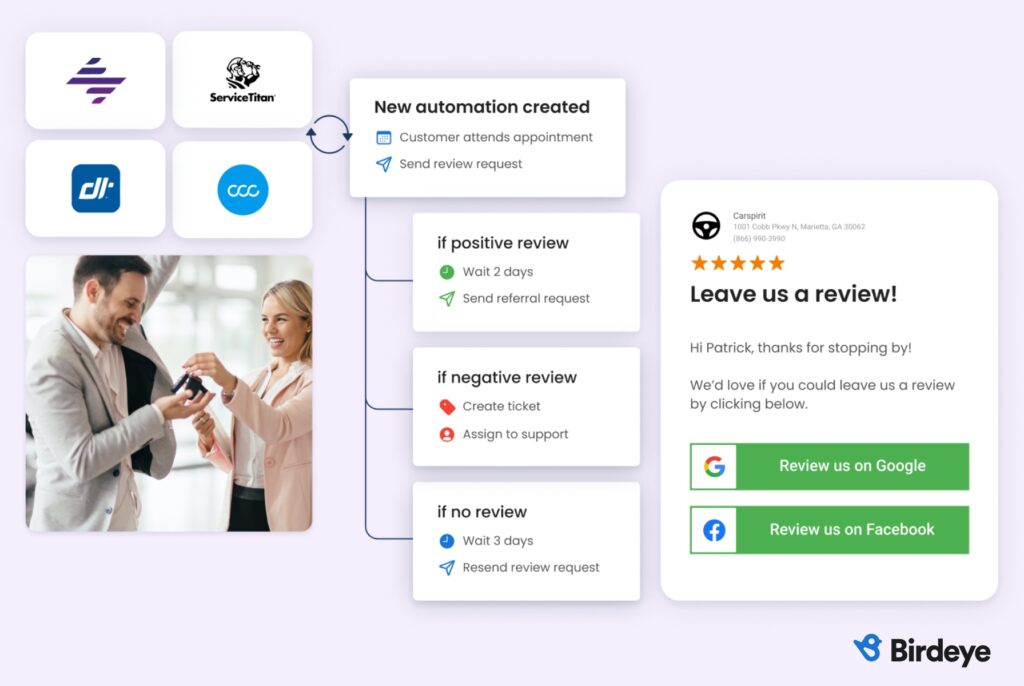
Start your AI marketing journey with Birdeye’s proven platform. Our tools help you deliver exceptional customer experiences while maximizing marketing team efficiency.

Originally published









